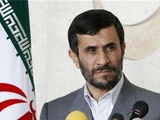|
|
TODAY.AZ / World news
Ahmadinejad: Iran ready to make uranium exchange deal
03 February 2010 [12:52] - TODAY.AZ
Iran is ready to complete a uranium exchange deal with world nuclear powers, Iranian President Mahmoud Ahmadinejad said Tuesday.
 Ahmadinejad said in an interview with state television that, after renewed talks with world powers, Iran was ready to exchange its low- enriched uranium for a more highly processed version to be used as fuel in the Tehran nuclear reactor.
Ahmadinejad said in an interview with state television that, after renewed talks with world powers, Iran was ready to exchange its low- enriched uranium for a more highly processed version to be used as fuel in the Tehran nuclear reactor.He said a contract would be signed to guarantee that the deal would be properly and fully implemented.
Ahmadinejad said that there have been some new developments after positive talks held recently with some of the countries involved in the negotiations.
He did not name the countries but observers believe those would have been Russia and China. Iranian Foreign Minister Manouchehr Mottaki also met last week in Davos with an unnamed adviser of French President Nicolas Sarkozy.
The Iranian president said that there were also agreements on exchanging the uranium on Iranian soil, but that Iran could also send its low-enriched uranium (LEU) abroad for further processing.
"We have no opposition to sending our LEU abroad, as we want to have constructive cooperation and as we can at any time produce the LEU again inside Iran," Ahmadinejad said.
"There will be a contract for calming down the concerns at home and for guaranteeing that the deal will be properly and fully implemented," he added.
The president said, for technical reasons, Iran could not exchange the uranium in three different phases.
According to a plan brokered in October by the International Atomic Energy Agency (IAEA), Iran's LEU was to be exported to Russia for further enrichment, and then to France for processing into fuel for a Tehran reactor.
At the time, Tehran said it was prepared either to buy the more highly enriched uranium outright, or exchange its own for more highly enriched uranium if the swap took place on Iranian soil.
The alternative would be for Iran to process its own uranium, he said. This is the scenario that the international community is seeking to avoid.
The world powers and the IAEA had also refused to have the handover take place in Iran.
Iran insists it has the right to pursue peaceful nuclear development as a signatory of the nuclear Non-Proliferation Treaty and an IAEA member and rejects Western charges that it has been working on a secret programme to make an atomic bomb.
However, its lack of transparency regarding its nuclear programme and refusal to suspend uranium enrichment have led to several United Nations Security Council resolutions imposing sanctions against the Islamic state.
/dpa/
URL: http://www.today.az/news/regions/60748.html
 Print version
Print version
Views: 2095
Connect with us. Get latest news and updates.
See Also
- 15 November 2024 [23:30]
United States deploys naval reconnaissance aircraft in Scotland - 15 November 2024 [22:27]
Schumacher's latest car is up for auction - 15 November 2024 [21:46]
Tbilisi City Hall allocated 8.6 million lari for New Year's events - 15 November 2024 [20:48]
Iran prepares to treat women who violate hijab law - 14 November 2024 [23:45]
Minister Bayraktar emphasizes Turkiye's role in net zero emissions - 14 November 2024 [23:26]
Poland deployed South Korean K2 tanks near border with Russia - 14 November 2024 [22:50]
Pentagon spent $1 billion on the US military industry - 14 November 2024 [21:40]
US budget deficit quadrupled in year - 14 November 2024 [20:19]
Impressive warehouse discovered in Turkiye - 14 November 2024 [18:48]
Armed robot dog 'BARS' shows off in sniper competition
Most Popular
 Azerbaijan's Leadership at COP29: Addressing Global Climate Challenges and Exposing Hypocrisy
Azerbaijan's Leadership at COP29: Addressing Global Climate Challenges and Exposing Hypocrisy
 Provocateur Le Pen go to jail
Provocateur Le Pen go to jail
 Macron Stung by President Ilham Aliyev's Truth: French Minister Ordered to Skip Baku Visit
Macron Stung by President Ilham Aliyev's Truth: French Minister Ordered to Skip Baku Visit
 Who uses Greta Thunberg and how?
Who uses Greta Thunberg and how?
 Climate Platform for business, investment & philanthropy launched within COP29
Climate Platform for business, investment & philanthropy launched within COP29
 United States announced plans to deepen security cooperation with Indonesia
United States announced plans to deepen security cooperation with Indonesia
 Azerbaijan’s COP29 presidency sets precedent with focus on amplifying voices of vulnerable nations
Azerbaijan’s COP29 presidency sets precedent with focus on amplifying voices of vulnerable nations
